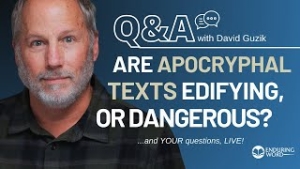“Is Reading Apocryphal Books Helpful or Harmful?” Live Q&A for August 29, 2024
Is Reading Apocryphal Books Helpful or Harmful?
Understanding the distinction between the Apocryphal Books of the Old Testament and the Apocrypha of the New Testament.
Some of the Apocryphal Books of the Old Testament
- 1-2 Esdras
- Tobit
- Judith
- Wisdom of Solomon
- Ecclesiasticus
- Prayer of Manasseh
- 1-2 Maccabees
- Additions to Esther and Daniel
These are accepted by Roman Catholics and Eastern Orthodox as Scripture – included in their Bibles.
These are accepted by some Protestant traditions as helpful for instruction, but not as Scripture. They were included as separate but helpful in the 1534 Luther Bible, and in the Geneva Bible.
Some of the Apocryphal books are in the Codex Vaticanus, Codex Sinaiticus (4th century) and Codex Alexandrius of the 5thcentury).
Problems with the Apocrypha
- These books never appeared in the Hebrew canon (collection of recognized books of holy Scripture). The Jewish people never recognized them as part of the collection of Scripture.
- Josephus (as a Jew) rejected the Apocrypha as being part of recognized Scripture.
- Philo, an influential Jewish philosopher, quoted from much of the Old Testament but never quoted from or mentioned any of the apocryphal books.
- No New Testament writer quotes from the Apocrypha or refers to those books in the New Testament. This includes Jesus Himself, Paul, John, Peter, and the rest.
- In the New Testament, there are something like 283 direct quotations of the Old Testament – but none of the Apocryphal books.
- In the New Testament, there are nearly 1,000 references to the Old Testament – but none of the Apocryphal books.
Is the Old Testament Apocrypha helpful or harmful?
These books can be helpful if read as history, or as background to their times. They shouldn’t be accepted as Scripture but have been respected by some Christian traditions for a long time. They can be harmful if accepted as Scripture.
The New Testament Apocrypha
These include:
- Infancy gospels
- Gospel of Thomas
- Gospel of Marcion
- Gospel of Peter
- Gospel of Mary
- Gospel of Nicodemus (Also called the “Acts of Pilate”)
- Acts of Andrew, Barnabas, John, the Martyrs, etc.
- Apocalypse of Paul, Peter, etc.
These books are late fakes and should only be read as background interest to see what people were making up about Jesus and the early church. Harmful, not helpful.



